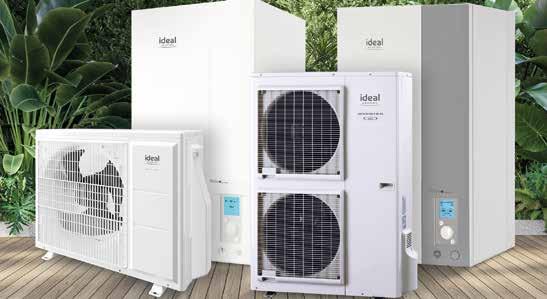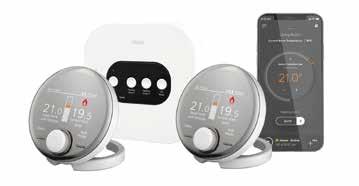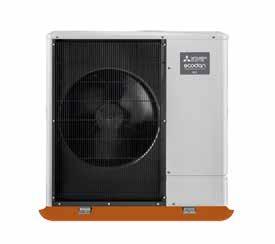
5 minute read
Energy efficiency
Go further to go greener
What changes are coming this year to increase energy efficiency in the UK’s homes? Lizzie Wilkinson, head of Domestic Product Management at Ideal Heating, takes a look at the new initiatives and regulations – and what they mean for you and your customers.
Low-carbon heating technologies to make homes more energy efficient are crucial to reaching the government’s target of net zero greenhouse gas emissions by 2050. The government has set out a combination of regulatory approaches, funding and incentivisation to decarbonise heating and hot water, two of which will start in 2022: the Boiler Upgrade Scheme (BUS) and new Building Regulations.
The BUS will provide homeowners in England and Wales with grants to offset the cost of installing certain lowcarbon heating systems, such as heat pumps. However, some exclusions do apply, including hybrid systems that use a fossil- fuel source, new-build homes and social housing. The new heating system must also meet certain requirements – eg, heat pumps must have a minimum seasonal coefficient of performance (SCOP) of 2.8.
Not enough
The BUS differs from the outgoing domestic Renewable Heat Incentive in that homeowners will be supported out the outset rather than waiting for quarterly payments. But with a cap of 30,000 installations per year over three years, amounting to a total investment of £450 million, it’s simply not enough to drive the uptake of heat pumps at scale in privately owned retrofit properties.
New Building Regulations are due to come into effect in June 2022 and are billed as interim regulations before the Future Homes and Buildings Standard are introduced in 2025. Most of these regulations will only impact new-builds, which will need to produce 30 per cent lower carbon emissions than the current requirement.
The greatest impact on heating engineers replacing old heating systems will be the new system sizing requirements and updated guidance on water treatment. New system sizing regulations will only apply if the whole heating system is replaced,
including the pipework and radiators, not just the boiler.
It’s proposed that all parts of the system should be sized to allow a maximum flow temperature of 55°C or lower. Where this is not possible, the lowest design temperature that will meet the heating needs of the home must be met instead.
The new regulations on water treatment state that central heating and primary hot water circuits should be thoroughly
cleaned and flushed before fitting new appliances, ensuring that they are protected against scale and corrosion.
While the new scheme and regulations may not directly impact your customers now, there are other simple solutions to help them to use their energy more efficiently. Smart controls are a great option for people who will not be overhauling their heating system any time soon.
Smart thermostats enable households to monitor and adjust their heating schedules to suit their lifestyles. Wi-Fi options and apps mean that people can control their heating on the go, and geolocation turns the heating on and off simply by detecting their whereabouts.
Certain smart controls can also detect faults as they arise, helping to limit the time a system is working inefficiently. And features such as enhanced load compensation help meet current Boiler Plus regulations.
It’s clear that no single measure will enable the UK to hit its net zero target and decarbonise the nation’s homes. While the BUS and new Building Regulations will have some impact, we need to go further, particularly in supporting those looking to upgrade the heating in their homes. n

Heat pumps and smart thermostats will help the UK reach net zero – but they’re not the only way
Max that heating efficiency
The efficiency and performance of a domestic heating system depends on more than just the boiler alone. Other essential components, such as the flue and controls used, will all have an effect, says Sean Keleher, national technical manager at Navien.
The latest oil and gas boilers have been designed to optimise energy efficiency, while ensuring ease of installation, servicing and commissioning. The latest heat exchanger technology often uses stainless steel for longevity and resistance to corrosion. Indeed, the environmental credentials of condensing gas boilers have been known for years, while oil boilers using blue-flame burners now offer equally impressive levels of energy efficiency.
Of course, every company wants to extol the features and benefits of their own products but it’s not just the boiler that has an impact on energy efficiency: buying the additional components such as the chimney/flue and controls all from the same manufacturer can also benefit.
Without having the correct chimney/flue in place, safety and effectiveness can be compromised. Installers will know the Ø60/100 plastic concentric flue system frequently used on gas boilers; however, it is worth noting this is just as effective on oil-fired products.
Up and across
While flues can be installed either horizontally or vertically, the actual distance by which they can be extended varies. After all, the total flue lengths are determined by the ability of the boiler – which explains why some flues only extend to around 6-8m, yet other manufacturers can offer lengths up to 21m for improved flexibility.
Boilers should also be fitted with the latest heating controls, which are integral to enhancing the system’s overall efficiency. Many boilers come supplied with control units so that they can be integrated almost immediately. However, as with flues, each individual controller varies in terms of functionality.
Manufacturers will have designed their own specific controls to perform more effectively than someone else’s. A primary factor for this is the digital communications protocols used to ensure a boiler and its associated controls can ‘talk’ to one another without error. Having constant communication between the thermostat and boiler provides accurate temperature control, while ensuring the correct amount of heat is provided to the system at the right time.
Heating manufacturers will apply the same level of technical expertise to accessories such as flues and controls as they do to their boilers. And by ensuring that each key component is produced by the same manufacturer, gas engineers know that the heating system will work to its maximum potential and efficiency.
An added benefit is that any training or technical requirements will all be handled by the same company, without having to juggle different points of contact. n
TO
HELPING YOU DELIVER SUSTAINABLE HEATING SOLUTIONS
As more and more homeowners choose air source heat pumps, now is the time to invest in your business and partner with Mitsubishi Electric for success.

MANUFACTURED IN THE UK Multi-awardwinning range of air source heat pumps Market-leading ultra quiet sound levels
Guaranteed low temperature operation
Smart control and remote monitoring via MELCloud App Expert training, after sales and technical support
Find out more on why Mitsubishi Electric and Ecodan are the best choice for your business
ecodan.me.uk/ upskill4







